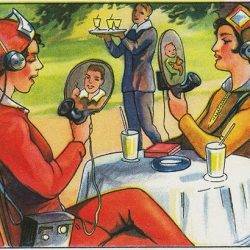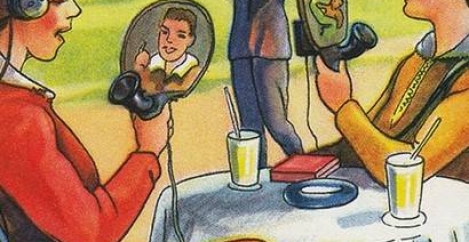September 10, 2019
Shakespeare, steampunk and our immersion in tech soup
 Technology is always remarkable in its own time, indistinguishable from magic for an increasingly fleeting moment before the stardust fades and it becomes mundane, subverted by our unintended uses, its own unintended consequences and the very way it inveigles itself into the background of our existence, blurring identities, changing the way we view ourselves and others and shattering the compartments into which we once found it easy to separate the different parts of our lives.
Technology is always remarkable in its own time, indistinguishable from magic for an increasingly fleeting moment before the stardust fades and it becomes mundane, subverted by our unintended uses, its own unintended consequences and the very way it inveigles itself into the background of our existence, blurring identities, changing the way we view ourselves and others and shattering the compartments into which we once found it easy to separate the different parts of our lives.
This is the theme of a remarkable book by tech pioneer and commentator Jaron Lanier called Ten Arguments for Deleting Your Social Media Accounts Right Now and his earlier book You Are Not a Gadget. Lanier’s core argument is that our immersion in technology means we are already cyborgs but that we still have the capacity to reclaim something purely human from the soup of tech and media in which we wallow. All we need to do is find the off switch.
Yet even most of the stuff we now obsess over and its consequences was once imagined in the past. When you see the above image from a German magazine dating back to the 1930s we see it as thoroughly modern: as a piece of what we would now refer to as Steampunk ; and in terms of the functionality of the technology and the way the women are ignoring each other in favour of their stuff and the digitised people within. It resonates decades later precisely because of its essential truism – we are drawn through the looking glass.
The caption itself is worth mentioning, because it translates as:
“Wireless Personal Phone and Television
Everybody now has their own transmission and receiving device with which they can talk to friends and family on a specific wavelength. But television technology is now so far advanced that it is possible to see your friend’s face at the same time. Sending and receiving is no longer restricted to just one place but with a device that can be carried around in a case no bigger than a camera.”
The image was resurrected on the rather wonderful Retrofuturism blog which is full of this kind of thing, leaving you to wonder whether we ever truly create anything new but just tap into old ideas whose time has come, while we remain the same mess of contradictions, easily swayed by the world beyond the glass.
Even these sorts of musings have been expressed more eloquently and poetically before. In this case by none other than William Shakespeare himself, in his 59th Sonnet. And even this is a callback to a previous piece of writing, the verse from the Book of Ecclesiastes that tells us ‘there is nothing new under the Sun’. It really is just turtles all the way down.
If there be nothing new, but that which is
Hath been before, how are our brains beguiled,
Which, labouring for invention, bear amiss
The second burden of a former child.
O, that record could with a backward look,
Even of five hundred courses of the sun,
Show me your image in some antique book,
Since mind at first in character was done!
That I might see what the old world could say
To this composed wonder of your frame;
Whether we are mended, or whe’er better they,
Or whether revolution be the same.
O, sure I am, the wits of former days





















What Shakespeare can teach you about... Shakespeare for Kids
September 16, 2013 @ 6:36 pm
[…] Obsession with Technology […]